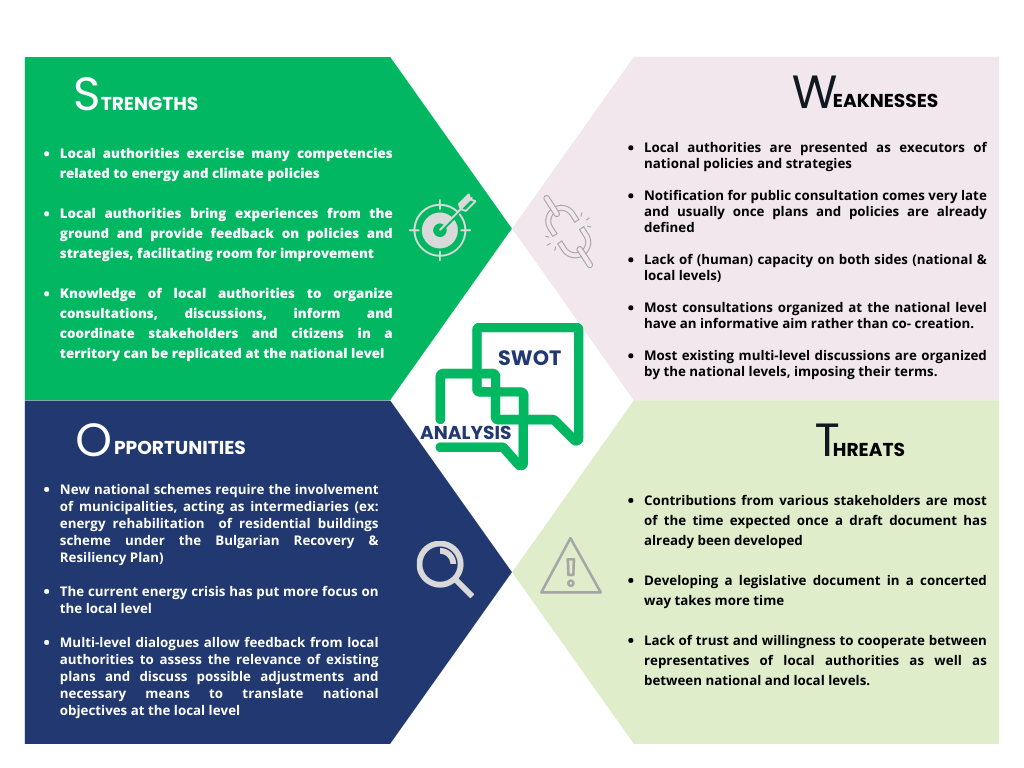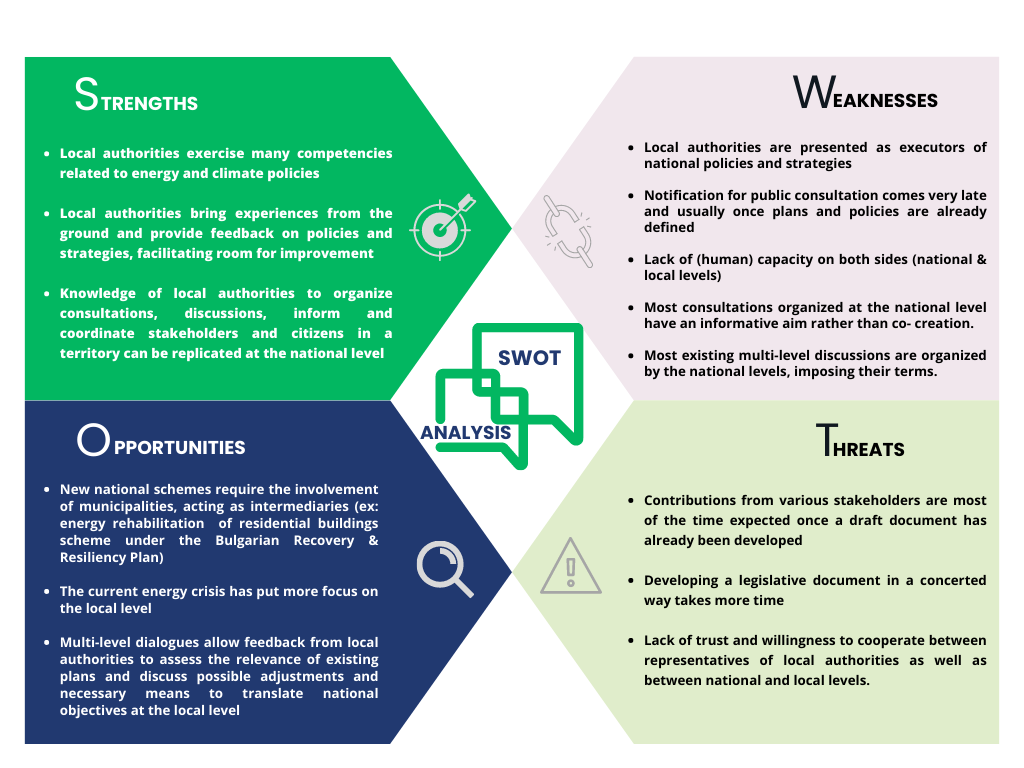What makes it tougher or easier for cities to meet their climate and energy targets?

The LIFE-funded project NECPlatform releases a new report, in two parts, analysing local level participation and role in national climate and energy decision-making process particularly NECPs as well as assessing city obstacles in the implementation of their local energy and climate policies.
The first part provides a SWOT analysis of the active participation of the local level in the process of drafting NECPs in Bulgaria, Croatia, France, Italy, Portugal, and Romania, the project focus countries. In a second part, each national partner explores barriers that local authorities encounter in implementing the energy transition locally.
Strenghts, Weaknesses, Opportunities and Threats of local level participation
SWOT analyses collect strengths, weaknesses, opportunities, and threats into an organized list and are usually presented in a simple two-by-two grid. 6 SWOTs are available in the report, providing a picture of the current landscape of multilevel discussions and reflecting on the arguments that could be used to convince the different stakeholders to participate in the national roundtables the project partners will organise and take ownership of. The SWOT analyses present differences related to political contexts, cultural heritage, and administrative national structures. Nevertheless, some similarities and common patterns emerged. These common points are those that can be activated at a European level by questioning the conditions of their existence and the measures that can be taken to facilitate multi-level dialogues within each Member State.
An additional infographic was developed after a cross-country analysis revealing the common patterns across the 6 countries.

The report highlights the strengths and opportunities on which local authorities can rely to reinforce their participation in national energy and climate policy-making processes. At the same time, local governments must be aware of certain threats, often beyond their control, and mitigate their weaknesses. The arguments to reinforce the role of local authorities in NECPs are different from one country to another. In some countries, highlighting that local authorities are legitimate and have field expertise to share in national climate and energy law-making processes is key. In others, it is about convincing that local governments are willing to implement national measures and lead the transition on the ground. One common point that emerged from the various analyses is the lack of trust and transparency between the various stakeholders involved in the discussion.
Barriers faced by local authorities
Nevertheless, local governments are facing several barriers preventing them from carrying out their energy and climate transition and threatening their position in these discussions. The second part of the report looks at these barriers to ensure that the reflections can feed national discussions and reassure national authorities about the intention of local authorities.
Each NECPlatform project partner defined and explored a chosen barrier based on discussions with the local authorities of the country as part of this project, as well as through additional interviews and literature on the subject.
The barriers chosen by national partners can be distributed into three categories:
- barriers linked to the lack of staff in local administrations (Portugal, and Croatia) and expertise to make qualitative local energy plans (Bulgaria)
- barriers linked to the difficulties of accessing the data (Italy and Romania)
- barriers related to the lack or complexity of funding opportunities (Croatia and France)
Proposals and possible solutions that can be brought up during the dialogues organised by the NECPlatform project in each of the six countries were prepared and can be accessed in the report. The analysis reveals common features, although the barriers chosen are country specific. In particular, the lack of skills and qualified human resources exist in all the countries of the project and is often an underlying reason of all barriers (credibility of local planning, access to financing, access to data). Without human resources able to implement projects on the ground, action plans are useless. Same goes for training opportunities. The focus should be on unlocking investments to hire new people in city administrations.
In addition, the acceleration of the ecological transition at local level faces not only external obstacles (such as the lack of financing or human resources) but also internal ones. Many municipalities today have political priorities that do not always include ecological transition or are overshadowed by stronger priorities, such as attractiveness or economic development policies, especially in the case of large cities.
Yet, it is key to provide the conditions for local authorities to overcome these barriers to guarantee that the ecological transition is faster. High-quality local planning, and sound implementation can then inform the national level to achieve adequate and ambitious planning at national level. It is therefore essential to give local authorities the means for their climate actions and to organize a quality dialogue to ensure that these actors can be reliable partners of the central State for the implementation of the objectives on the ground.
What’s coming next?
NECPlatform will go on for 18 more months to do so, and organises the next dialogue in Rome, Italy, 16-17 of October, prior to the event Grafting Cities: Cultivating Our Common Future where you can also meet the project team (October 19, Modena, Italy, full programme here). Catch up and read about the first dialogue in Italy (and other countries here).
The post What makes it tougher or easier for cities to meet their climate and energy targets? appeared first on Energy Cities.
Fuente: ENERGY CITIES
Enlace a la noticia: What makes it tougher or easier for cities to meet their climate and energy targets?

